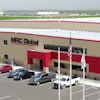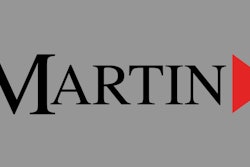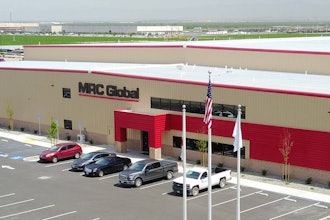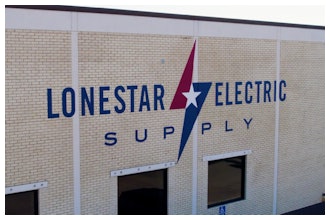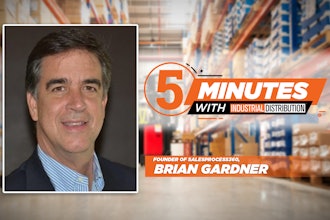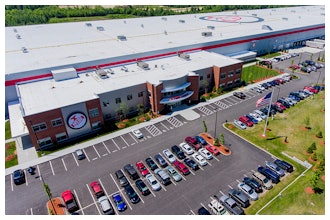This article first appeared in the November/December issue of Industrial Distribution. To view it in the original format, please click here.
It is unusual to come across someone today who has spent almost their entire career at one company. It is even more unusual to find multiple people who have spent their entire career at that same company.
Yet, this is the case with Tencarva Machinery Corp. based in Greensboro, NC, where Rod Lee (President), Harold Muse (Executive Vice President), Harry Taylor (Vice President of Operations), and Don Wirth and Wayne Tatum (VPs not pictured), have been working together since before the company began in 1978. Joined by Ed Pearce, the current Secretary/Treasurer, these men help to oversee a company that keeps moving upward on the Industrial Distribution Big 50 List.
This wasn’t always the case. Thirty-five years ago, Lee, Muse, and Taylor were part of a group of men who started the company from scratch. The entire group – 18 salesmen and one lone finance officer – had been employees at Tidewater Supply Co. in the seventies, and they all loved their jobs. Tidewater sold out when the owner reached retirement age, and things changed. Five of the 19 men decided that they would start their own company. The other 14 decided to follow.
Today, Tencarva is an employee-owned company about to go through a major transition. President Rod Lee is retiring December 31st of this year, but you wouldn’t know it based on the lack of panic on everyone’s faces. “It is sort of a non-event when we have a management change,” notes Lee, and they have the five founders to thank.
When the founding directors of Tencarva – H. Vernon Cashwell, J.S. “Jack” Miller, Robert S. “Bob” Paschal, W.L. “Dick” Smith, and William H. “Bill” Stewart – set out to create their own company with their own capital, they could have done it in a way that most benefited them. Instead, they created a company that would best serve itself and its employees.
“They could have put together their own company and gotten us to come and work for them. Instead, they started right out conceiving of Tencarva as an employee-owned company with each of the employees being given the opportunity – not the obligation, but the opportunity – to purchase stock,” says Lee.
When an employee leaves the company, as Lee will do at the end of this year, he or she sells their shares back and relinquishes all financial ownership and financial influence. Lee will stay on as a member of the board in an advisory position, but will no longer have direct management of any part of the company. Ed Pearce will take over as president, and the transition will likely go as smoothly as previous transitions have.
“They set this up in a rather selfless way with the understanding that they needed us to cover the territory and bring the expertise that we had to the table. They could have done it differently, but they didn’t. That is what has made the transition between presidents so uneventful,” says Lee.
Stick to the Goal
The original goal of Tencarva was simple: To create a good place to work and a solid foundation from which to serve customers.
“Eighteen of us were salespeople,” says Lee. “We were sales driven from the beginning. Everybody loved what they did and loved their customers, and just wanted to serve them the best way possible.”
While Tencarva’s goals remain the same, Muse says the execution is much different. “Industry has changed. Our customers used to be much more self-sufficient. Industrial plants had more ability to do their own repair work, to carry more inventory, to do more installs,” he says. That is not the case today. Instead, distributors are faced with filling the gaps left between manufacturers and their customers.
“Even before it became a buzz word, Tencarva was value-added,” say Pearce. “Much more is required of distribution now.”
In response to whether or not it was a struggle for Tencarva to slip into the role that manufacturers were neglecting to fill, Lee answers like a true salesman: “it was an opportunity.”
“Although we didn’t have any servicemen originally, we have always been hands on. As a sales engineer, if I had a customer that I wanted to sell a seal to, I would install it for him. We weren’t selling service, but service was always part of the action.”
Training for the Long Haul
In addition to their employee-owned philosophy, Tencarva places an intense emphasis on training, both for the employee and the customer. Hiring technically astute individuals is the first step in this training process. Instead of hiring salespeople and then teaching them the product line, Tencarva prefers to hire individuals who know how the products work — and then teach them to sell. “We bring young, talented engineers out of college, train them, let them see what we do and how we do it,” says Taylor. “A lot of them are hands on and are able to work with a customer to find out what their particular problems are and then apply the proper equipment to solve that — that is really the thing that distinguishes us from other sales companies.”
Muse adds that they emphasize customer solutions over product sales. “We are not selling pumps. The pump is the part that shows up on the loading dock that receiving can mark and send the paperwork to accounts payable so that we can get paid. What we are really selling are solutions to problems. We want people with strong backgrounds that are bright, because we require a lot of them.”
Training for new sales personnel includes several weeks in the back room shadowing repairmen and learning to do repairs themselves. Trainees tear product apart and put it back together, take inside sales calls to become familiar with the various product lines, and then tag along with a seasoned rep to get field experience. The process is different for every employee, allowing them to spend more time in areas as they need, but each trainee has certain benchmarks they must reach before they can be considered “trained.” Pearce says that new hires are actually a cost to the company for at least two years before they become profitable salespeople. While this process is tedious, it is all worth it in the end, even from a strictly financial perspective: Tencarva employees tend to stay with the company longer than is usual.
“Once they are in a territory, normally they are there for the rest of their career,” says Taylor. “In many cases, they know the customers’ plants as well or better than the customers themselves. A lot of time the customers’ people will move along and our guys are still there working the same accounts.”
Muse chalks it up to the fact that once again, Tencarva is focused on the long-term. Just as the founding directors were forward thinking, so too is the current management, preparing employees – and the company — for the future. “It is important to us to have long term sales people — because it takes a long time to learn all of this. Experience is important. The fact that we have a really good retention rate with our salespeople can be attributed to the fact that they enjoy their jobs and they are compensated well. Not every day is a great day, but there are a lot of challenges and a lot of reward.”
Another part of the equation for Tencarva is to help the customer be as successful as possible. The company does everything from teach basic centrifugal pump fundamentals to going out to customer plants and doing seminars. “When we can help educate the customer,” says Muse, “it increases their awareness of us, helps communication with the customer as we both use the proper terminology, and raises our level in their eyes so that we become the subject matter experts.” Tencarva has also qualified some of these sessions as continuing education credits for customers.
“We are constantly trying to tailor to customer needs,” says Lee.
Acquisition Strategy
Another way Tencarva meets customer needs is by expanding their service offerings through company acquisition. With ten acquisitions since 2001, it might look like Tencarva is a company on the hunt. Lee says that is not necessarily the case.
“I always say that we are not an acquisitive company, but we are always open to opportunities,” he says. “We have actually personally known each of the companies that we have acquired before we acquired them. For the most part, the companies were not ‘for sale’ when we first spoke to them, but they were good strategic fits – typically in the same business selling some of the same products.”
Tencarva isn’t looking to flip unsuccessful businesses or take on a problem branch just to garner more sales territory. “We really want to acquire companies that are a culture fit,” says Taylor. “We want them to think like we think and want their customers to already hold them in high regard.”
When Tencarva purchases another distributor, it often solves the problem of retirement for the current owners. One owner, Robert Hudson of Hudson Pump & Equipment in Florida, is still with the company after 12 years. “He can choose his retirement date whenever he wants to, he doesn’t have to worry about who is going to buy the company,” says Lee. What is very important to most owners is that the people that helped build the business have a future at the new company. Tencarva’s buyout agreement is that strategic employees come, too. “We don’t have a difficult to enter business,” says Lee. “When you buy a distributor, the only thing you are buying are their people.”
As Taylor says: “We are collecting talent.”
Another reason Tencarva acquires a company is when they are the company’s number one customer. This was the case with the 2010 acquisition of ESSCO (Electrical Service & Sales), a distributor of electrical motors and controls. Bringing the company and their product in house was a smart vertical integration. Similarly, the purchase of UniGuard gave Tencarva a manufacturing segment in their warehouse. These polyethylene machine guards are packaged with the pumps and controls Tencarva sells to help provide a single, complete solution for their customers.
Transitioning for the Future
Is anyone worried about Lee’s retirement at the end of the year? Not at all, thanks to their director’s foresight.
“The only difference this time is because Ed (Pearce) will be the first president of Tencarva that did not come up through sales. He wanted to get more face time with customers in preparation for becoming president, but it is unusual for the CFO to go out and make sales calls. We decided that we would make this announcement early so that we could have better transparency.”
These transitions are fairly logical for the company. Pinpointing future leaders and moving them to increasing levels of management to prepare them for their future responsibilities just works for Tencarva. “We’ve got people in the next few years who will be moving out. We are grooming people as replacements and everyone knows it. By the time it actually happens, it won’t be a shock to anyone,” says Lee.
Will things change at Tencarva once the transition is complete? Pearce doesn’t think so. “We’ve got a good foundation and a good model. There is no reason to try anything different.”

